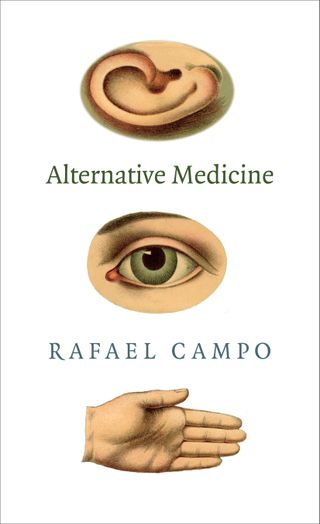
Can Poetry Ease the Arrival of Death?
Adam Kampe, media specialist for the National Endowment for the Arts, contributed this article to Live Science's Expert Voices: Op-Ed & Insights.
Dr. Rafael Campo is that rare kind of human being who's both right and left-brained. Not only is he a doctor, but he's also a published and well-respected poet. Campo is as serious about the power of medicine as he is about the power of poetry. He deeply believes the arts and the humanities can heal, and unlike many folks who say that somewhat figuratively, he means it literally. Campo reads poetry with his patients to help navigate a new illness or a troubling diagnosis, and he also teaches writing workshops at his hospital.
Campo teaches at Harvard Medical School and works at Beth Israel Deaconess Medical Center, where he was when we spoke about poetry, art, and health, and how all three intersect with one of his poetry idols, Emily Dickinson.
Below is a modified transcript of our discussion. You can listen to the original interview in the audio of our talk with Campo.
ADAM KAMPE: You're a physician and a poet?
Rafael Campo: Yes, believe it or not.
A.K.: Are you trying to make the rest of us look bad?
Sign up for the Live Science daily newsletter now
Get the world’s most fascinating discoveries delivered straight to your inbox.
R.C.: I promise that's not the case. I'm not trying to make others look bad. I'm just very proud of my dual life and want to do in any way that I can [do] service to poetry and literature — especially in the world of doctors where we don't have enough presence of the arts and humanities, in a broad sense, in the work that we do.
A.K.: I certainly hope other doctors take your lead. So we're in part going to be talking about you and your career, and also as we mentioned Emily Dickinson. How does Emily Dickinson fit into the idea of arts and medicine?
R.C.: I think [Emily Dickinson] is an extraordinary poet for so many reasons, but I think probably not appreciated as much as she should be for the ways in which she interrogates the natural world and reflects on science as a way of understanding and knowing the world.
A.K.: For those who don't know, who is Emily Dickinson?
R.C.: Emily Dickinson in my view is probably [one of] the most, if not the most, important American poets. She was born in the early 1800s and died unfortunately at a relatively young age in her early fifties. She was fascinated by the natural world and by science. And, she lived at a time when there were tremendous advances being made in the realm of the sciences. The locomotive was invented [and] surgery was first performed with ether during her lifetime. [Anesthesia's Evolution: Satanic Influence to Saving Grace (Op-Ed)]
I find Dickinson's poems, in particular, really lend themselves to a conversation about how we live with illness that's extremely useful for many of my patients and actually for me, too, in trying to care for them. So I do, often, share her poems with patients.
A.K.: Do you recall the first time you read a poem by Emily Dickinson?
R.C.: I certainly do. The very first time I read her poems was when I was a student in high school, but I became much more deeply acquainted with her work when I was a student at Amherst College, and I remember spending many afternoons in her garden at Amherst, which was the Dickinson homestead. It's just across the street from the Amherst College campus, so I would spend many afternoons there reading her poems and flitting around in that garden like one of the birds or one of the butterflies that appear so frequently in her work. And that's when I really became truly enamored of her writing and poetry.
There's one that I always come to as a scientist that I always find just incredibly shocking, but also beautiful and transcendent in some sense. It's number 861 in the Johnson edition, "Split the Lark."
Split the Lark—and you'll find the Music— Bulb after Bulb, in Silver rolled— Scantilly dealt to the Summer Morning Saved for your Ear when Lutes be old.
Loose the Flood—you shall find it patent— Gush after Gush, reserved for you— Scarlet Experiment! Sceptic Thomas! Now, do you doubt that your Bird was true?
It truly is a singular experience. It's at once a kind of physical experience where one feels in a way possessed by this extraordinarily unique voice and then, at the same time, this engagement with just a formidable and very powerful intellect. And so it's at once a kind of visceral and cognitive experience, which gets to this connection between healing and poetry in her work, or perhaps this sort of scientific world view — this very, very fierce way of interrogating the world, and then also knowing it experientially through one's soul, through one's heart.
A.K.: I have a few poems from your collection Alternative Medicine that I'd like you to read, but I was curious if in the thread of what you were just talking about is there anything you would like to read?
R.C.: I was thinking one poem, in particular, because I wrote it actually thinking about Emily Dickinson and her work. It's called "Iatrogenic," which is sort of a funny title.
"Iatrogenic"
You say, "I do this to myself." Outside, my other patients wait. Maybe snow falls; we're all just waiting for our deaths to come, we're all just hoping it won't hurt too much. You say, "It makes it seem less lonely here." I study them, as if the deep red cuts were only wounds, as if they didn't hurt so much. The way you hold your upturned arms, the cuts seem aimed at your unshaven face. Outside, my other patients wait their turns. I run gloved fingertips along their course, as if I could touch pain itself, as if by touching pain I might alleviate my own despair. You say, "It's snowing, Doc." The snow, instead of howling, soundlessly comes down. I think you think it's beautiful; I say, "This isn't all about the snow, is it?" The way you hold your upturned arms, I think about embracing you, but don't. I think, "We do this to ourselves." I think the falling snow explains itself to us, blinding, faceless, and so deeply wounding.
A.K.: I know Alternative Medicine is your latest collection. When did you write that?
R.C.: Probably five, six years ago. I remember there was a really big snowstorm here in Boston. I was in my clinic seeing patients and thinking of Dickinson's work, and in my experience of sharing it with the others — and certainly every time I encounter it I think of her and I think of that give and take, and a sense of empathy, that is so hard for us in some ways to define. My colleagues in medicine tease me a lot about this and say, "Oh, you can't define empathy and if you can't define it how are you going to teach it to medical students?" And that's another big part of my work here: trying to use the humanities, implement the humanities in medical education settings, in the curriculum here at Harvard, and colleagues are skeptical. They say, "The students have so much to learn and now you want to teach them poetry, and you can't even define empathy, so how are you going to teach it to them?" But I do think poems can help us to model empathy much more effectively than we do.

Every interaction with a patient is in some sense a form of poetry, and so I find myself just totally immersed in storytelling in the voices of other people, and that process, in a sense, is always shaping language in my head. And when I do have a moment to sit down, [with] a piece of paper in front of me or my journal, often what comes out is a poem that has been polished by this constant flow of language through my head and, to some extent, the sounds of the body that I hear through my stethoscope. I'm very attracted to so-called formal poetry or metrical forms because I think of those physical rhythms that I'm hearing all the time through my stethoscope, and even in conversation with patients. It's amazing how much of our spontaneous speech is iambic.
"Hospital Song"
Someone is dying alone in the night. The hospital hums like a consciousness. I see their faces where others see blight.
The doctors make their rounds like satellites, impossible to fathom distances. Someone is dying alone under lights,
deficient in some electrolyte. A mother gives birth: life replenishes. I see pain in her face where others see fright.
A woman with breast cancer seems to be right when she refuses our assurances that we won't let her die alone tonight;
I see her face when I imagine flight, when I dream of respite. Life punishes us, faces searching ours for that lost light
which we cannot restore. try as we might. The nurses' white sneakers say penances, contrite as someone dying in the night.
As quiet as mercy, the morning's rites begin. Over an old man's grievances, his face contorted in the early light,
an aide serenely tends to him, her slight black figure fleeting yet all hopefulness – her face the face of others who see light, like someone dying at peace in the night.
As a physician, [I spend] a lot of time thinking about exactly how our internal workings work, and listening to the beating of the heart and the ebb and flow of breathing, and thinking critically about pathophysiology and all of the science of those internal processes. And sometimes what I think is most powerful of all is simply experiencing the awe of it, and not necessarily knowing the answer to it, or necessarily even what the diagnosis might be. And there are many instances in medicine where even when we have the diagnosis there isn't going to be another round of chemotherapy, or there won't be another medication we can prescribe that eases the pain, and what do we have to offer our patients in those moments. I think it's poems like Emily Dickinson's that help us know mystery, and be present in mystery, in ways that maybe heal us, even if they may not be able to cure us.
Poems by Rafael Campo from his collection, Alternative Medicine, used by permission of the author and Georges Borschardt, Inc.
Poems by Emily Dickinson reprinted electronically by permission of the publishers and the Trustees of Amherst College from The Poems of Emily Dickinson, Thomas H. Johnson, ed., Cambridge, Mass.: The Belknap Press of Harvard University Press, Copyright © 1951, 1955, 1979, 1983, 1998 by the President and Fellows of Harvard College.
Follow all of the Expert Voices issues and debates — and become part of the discussion — on Facebook, Twitter and Google+. The views expressed are those of the author and do not necessarily reflect the views of the publisher. This version of the article was originally published on Live Science.













